-
ORIGINAL ARTICLE05-13-2024
Generalized Resistance Deficits in inmates with hypertension: missing resources that limit health
Revista Brasileira de Enfermagem. 2024;77(2):e20230246
Abstract
ORIGINAL ARTICLEGeneralized Resistance Deficits in inmates with hypertension: missing resources that limit health
Revista Brasileira de Enfermagem. 2024;77(2):e20230246
DOI 10.1590/0034-7167-2023-0246
Views0See moreABSTRACT
Objective:
to understand the Generalized Resistance Deficits of people deprived of liberty with hypertension in a Brazilian prison unit.
Method:
qualitative research, anchored in Salutogenesis, carried out with 38 people with hypertension from a Brazilian prison unit, from February to July 2022, with a semi-structured interview with open-ended questions, whose analysis was thematic, explaining the limitations to health in prison.
Results:
13 Generalized Resistance Deficits were reported, mostly related to the prison environment and, to a lesser extent, to the social group and the individual, respectively. Living in prison for people with hypertension implies living with a high number of Generalized Resistance Deficits, accentuating the movement towards the disease pole.
Final considerations:
knowing Generalized Resistance Deficits allows directing health promotion to support the use of available Generalized Resistance Resources and contributes to the expansion of intersectoral policies.

-
REVIEW05-13-2024
Lean methodology: contributions to improving work processes in health and nursing
Revista Brasileira de Enfermagem. 2024;77(2):e20230322
Abstract
REVIEWLean methodology: contributions to improving work processes in health and nursing
Revista Brasileira de Enfermagem. 2024;77(2):e20230322
DOI 10.1590/0034-7167-2023-0322
Views0See moreABSTRACT
Objective:
to investigate the contributions of applying the Lean methodology to improve work processes in health and nursing and its impact on associated financial aspects.
Method:
an integrative review, carried out in six databases, whose sample of ten (100.0%) studies was analyzed and summarized descriptively.
Results:
the outcomes obtained were stratified into: benefits/barriers to Lean Healthcare implementation; economic aspects involving Lean Healthcare implementation; and process improvements through Lean Healthcare implementation. The majority of studies (60.0%) were carried out in university hospitals, contexts that need to continually improve the quality of services provided, generally with scarce and limited resources, which support the viability of maintaining the teaching, research and extension tripod.
Conclusion:
three (30.0%) studies highlighted the financial aspects associated with Lean methodology application. The others only mentioned the possibility of financial gains through improving processes and reducing waste.
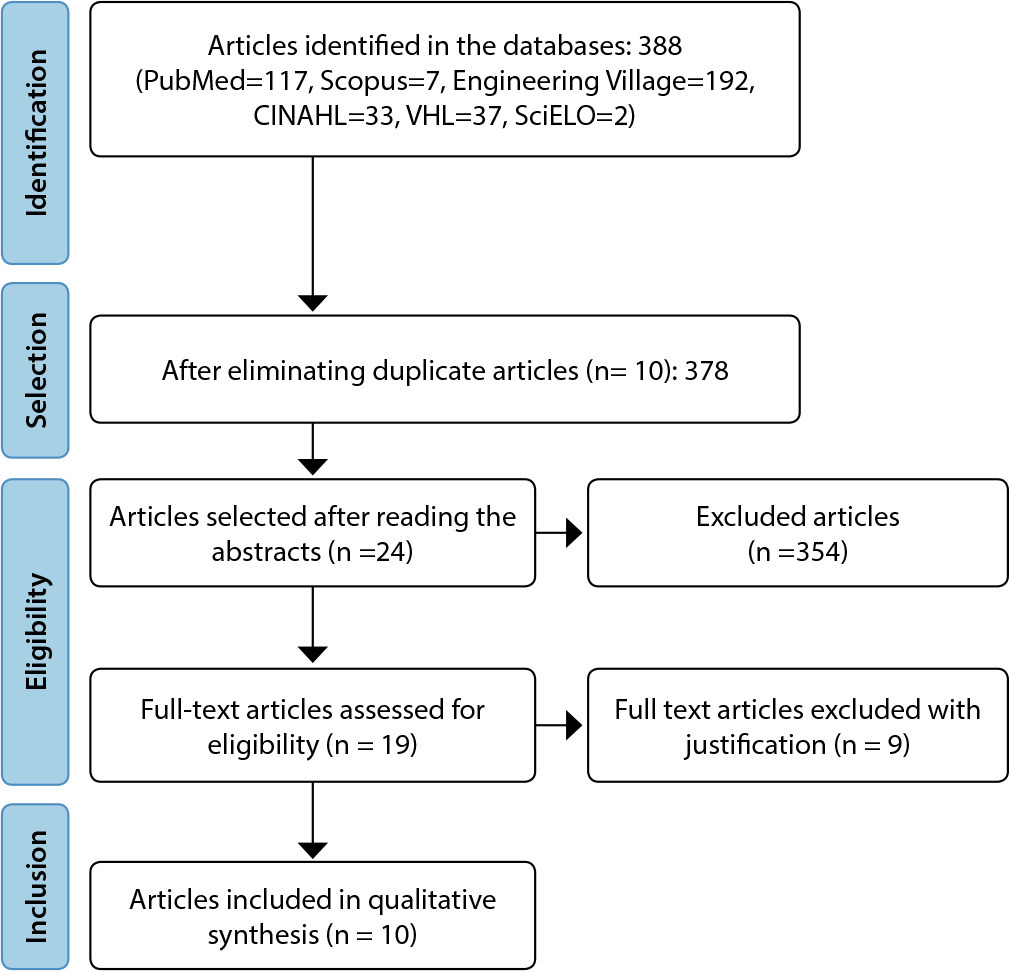
-
REVIEW05-13-2024
Stunting predictors among children aged 0-24 months in Southeast Asia: a scoping review
Revista Brasileira de Enfermagem. 2024;77(2):e20220625
Abstract
REVIEWStunting predictors among children aged 0-24 months in Southeast Asia: a scoping review
Revista Brasileira de Enfermagem. 2024;77(2):e20220625
DOI 10.1590/0034-7167-2022-0625
Views0See moreABSTRACT
Objective:
To identify predictors of stunting among children 0-24 months in Southeast Asia.
Methods:
This scoping review focused on articles with observational study design in English published from 2012 to 2023 from five international databases. The primary keyword used were: “stunting” OR “growth disorder” AND “newborn” AND “predict” AND “Southeast Asia”.
Results:
Of the 27 articles selected for the final analysis there are thirteen predictors of stunting in seven Southeast Asia countries. The thirteen predictors include the child, mother, home, inadequate complementary feeding, inadequate breastfeeding, inadequate care, poor quality foods, food and water safety, infection, political economy, health and healthcare, water, sanitation, and environment, and social culture factor.
Conclusion:
All these predictors can lead to stunting in Southeast Asia. To prevent it, health service providers and other related sectors need to carry out health promotion and health prevention according to the predictors found.
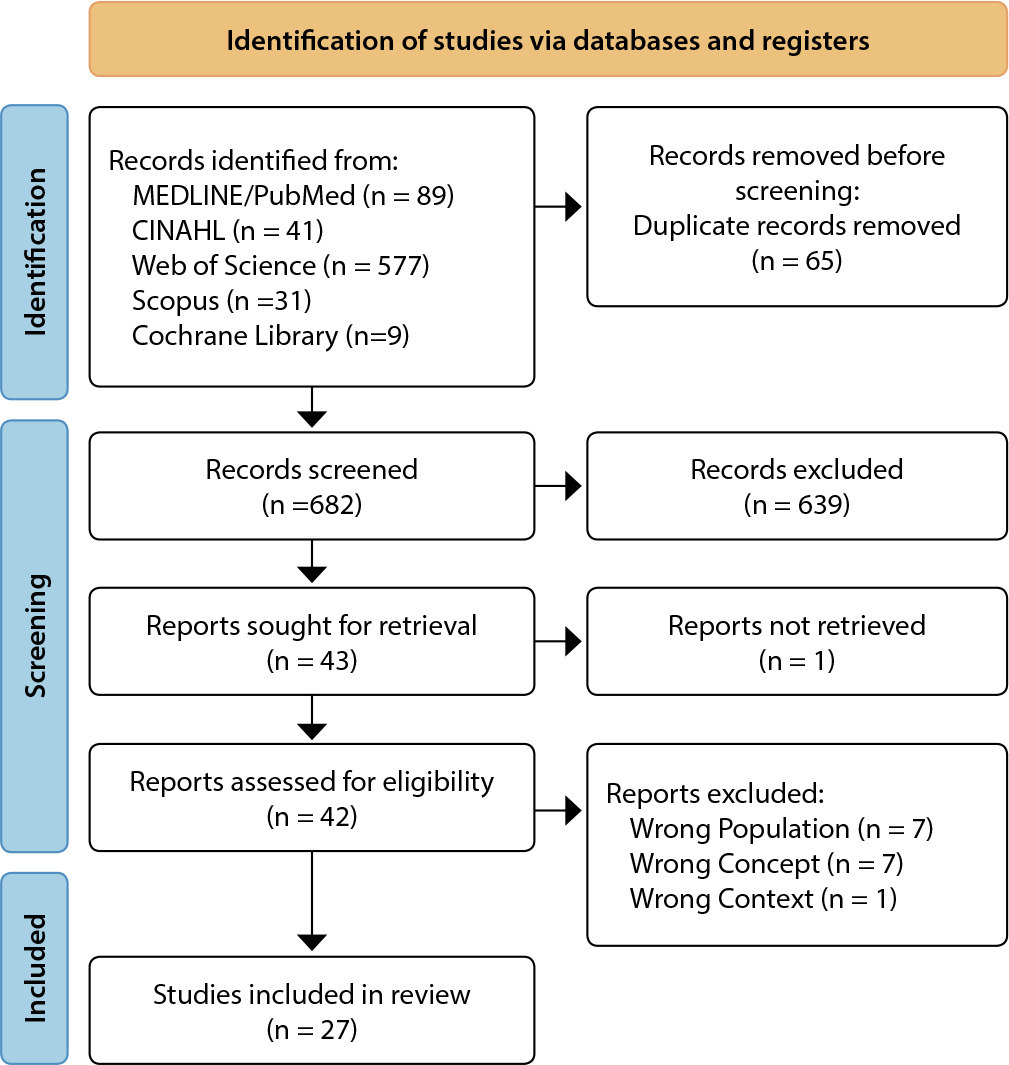
-
05-13-2024
A influência da internet nas escolhas sobre a saúde e o bem-estar dos idosos
Revista Brasileira de Enfermagem. 2024;77(1):e20230321
Abstract
A influência da internet nas escolhas sobre a saúde e o bem-estar dos idosos
Revista Brasileira de Enfermagem. 2024;77(1):e20230321
DOI 10.1590/0034-7167-2023-0321
Views0See moreRESUMEN
Objetivos:
describir el perfil de los ancianos que acceden a internet para buscar información de salud e identificar los factores que pueden influir en las decisiones de los ancianos sobre su salud a partir de la información recopilada en línea.
Métodos:
391 ancianos respondieron a un cuestionario online sobre hábitos y satisfacción con la información de salud recogida en internet. El procesamiento de datos implicó regresión logística.
Resultados:
la educación superior reduce en un 44% la probabilidad de que un anciano siga las recomendaciones de salud en los sitios web. Sin embargo, las actividades sociales y la salud autopercibida aumentan la posibilidad de seguir las recomendaciones en un 83% y un 71%, respectivamente. La creencia de que internet promueve hábitos saludables aumenta 29,2 veces la probabilidad de que un anciano siga un consejo.
Consideraciones Finales:
conocer el perfil de los ancianos que utilizan internet puede ayudar a los profesionales a formular políticas públicas y construir buenas plataformas de información sobre salud y bienestar.
-
ORIGINAL ARTICLE05-13-2024
The influence of the internet on choices about older adults’ health and well-being
Revista Brasileira de Enfermagem. 2024;77(1):e20230321
Abstract
ORIGINAL ARTICLEThe influence of the internet on choices about older adults’ health and well-being
Revista Brasileira de Enfermagem. 2024;77(1):e20230321
DOI 10.1590/0034-7167-2023-0321
Views0See moreABSTRACT
Objectives:
to describe the profile of older adults who access the internet to search for health information and identify the factors that can influence older adults’ decisions about their health based on information collected online.
Methods:
391 older adults answered an online questionnaire regarding habits and satisfaction with information about health collected on the internet. Data processing involved Logistic Regression.
Results:
higher education reduces by 44% the likelihood of an older adult following the health recommendations on internet sites. However, social activities and self-perceived health increase the possibility of following the recommendations by 83% and 71%, respectively. The belief that the internet promotes healthy habits increases by 29.2 times the probability of an older adult following the advice.
Final Considerations:
knowing the profile of older adults who use the Internet can help professionals formulate public policies and build good information platforms on health and well-being.
-
REVIEW05-13-2024
Technologies used in the treatment of burn victims in intensive care: a scope review
Revista Brasileira de Enfermagem. 2024;77(1):e20220738
Abstract
REVIEWTechnologies used in the treatment of burn victims in intensive care: a scope review
Revista Brasileira de Enfermagem. 2024;77(1):e20220738
DOI 10.1590/0034-7167-2022-0738
Views0See moreABSTRACT
Objectives:
to analyze the technologies used by the nursing team in the treatment of skin lesions caused by burns in patients under intensive care.
Methods:
this is a scope review conducted on the LILACS, Medline, PubMed, and CINAHL databases without temporal or language restrictions.
Results:
the highlighted technologies included the use of specialized dressings, biological agents such as probiotics and cyanobacteria, as well as negative pressure therapies and enzymes such as papain and collagenase. Some technologies, such as nanocrystalline silver, demonstrated efficacy in infection control.
Final Considerations:
the study identified essential technologies in burn care, emphasizing the need for further research on “soft” technologies. The findings support the promotion of evidence-based nursing care for burn patients in intensive care and enhance knowledge about effective treatments.
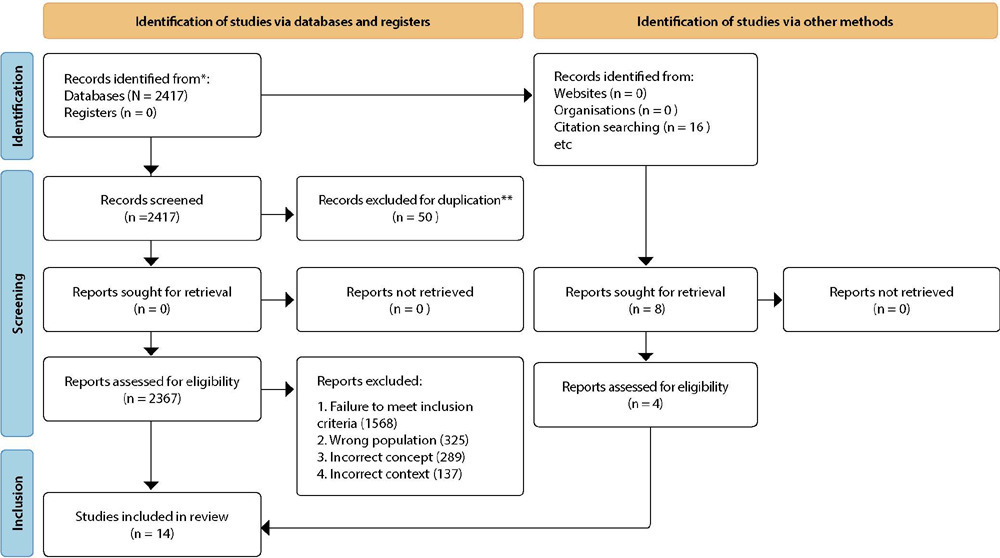
-
ORIGINAL ARTICLE05-03-2024
What is the burden of multimorbidity and the factors associated with its occurrence in elderly Brazilians?
Revista Brasileira de Enfermagem. 2024;77(1):e20220809
Abstract
ORIGINAL ARTICLEWhat is the burden of multimorbidity and the factors associated with its occurrence in elderly Brazilians?
Revista Brasileira de Enfermagem. 2024;77(1):e20220809
DOI 10.1590/0034-7167-2022-0809
Views0See moreABSTRACT
Objective:
To estimate the prevalence of multimorbidity in elderly people and its association with sociodemographic characteristics, lifestyle, and anthropometry.
Methods:
This was a cross-sectional study using data from the National Health Survey, 2019. A total of 22,728 elderly individuals from all 27 Brazilian states were randomly selected. Poisson regression models with robust variance were employed, and a significance level of 5% was adopted.
Results:
The prevalence of multimorbidity was 51.6% (95% CI: 50.4-52.7), with the highest estimates observed in the South and Southeast. Multimorbidity was associated with being female (aPR = 1.33; 95% CI: 1.27-1.39), being 80 years old or older (aPR = 1.12; 95% CI: 1.05-1.19), having low education (aPR = 1.16; 95% CI: 1.07-1.25), past cigarette use (aPR = 1.16; 95% CI: 1.11-1.21), insufficient physical activity (aPR = 1.13; 95% CI: 1.06-1.21), and screen use for 3 hours or more per day (aPR = 1.13; 95% CI: 1.08-1.18).
Conclusion:
Multimorbidity affects more than half of the elderly population in Brazil and is associated with social, demographic, and behavioral factors.

-
ORIGINAL ARTICLE05-03-2024
Cancer patient satisfaction regarding the quality of information received: psychometric validity of EORTC QLQ-INFO25
Revista Brasileira de Enfermagem. 2024;77(1):e20230358
Abstract
ORIGINAL ARTICLECancer patient satisfaction regarding the quality of information received: psychometric validity of EORTC QLQ-INFO25
Revista Brasileira de Enfermagem. 2024;77(1):e20230358
DOI 10.1590/0034-7167-2023-0358
Views0See moreABSTRACT
Objectives:
to psychometrically validate the European Organization for Research and Treatment of Cancer Core Quality of Life Questionnaire EORTC QLQ-INFO25 instrument and identify the domains that influence patients’ perception of the information received.
Methods:
a cross-sectional methodology with cancer patients in a Brazilian philanthropic hospital institution. Sociodemographic and clinical instruments, EORTC QLQ-C30, EORTC QLQ-INFO25 and Supportive Care Needs Survey – Short Form 34 were used. Analysis occurred using Cronbach’s alpha coefficients, intraclass correlation, test-retest and exploratory factor analysis.
Results:
128 respondents participated. Cronbach’s alpha coefficient was 0.85. The test-retest obtained p-value=0.21. In the factor analysis, one item was excluded. Satisfaction with the information received was 74%, with three areas with averages below 70%. In open-ended questions, there was a greater desire for information.
Conclusions:
validity evidence was obtained with instrument reliability, consistency and stability. Respondents expressed satisfaction with the information received.
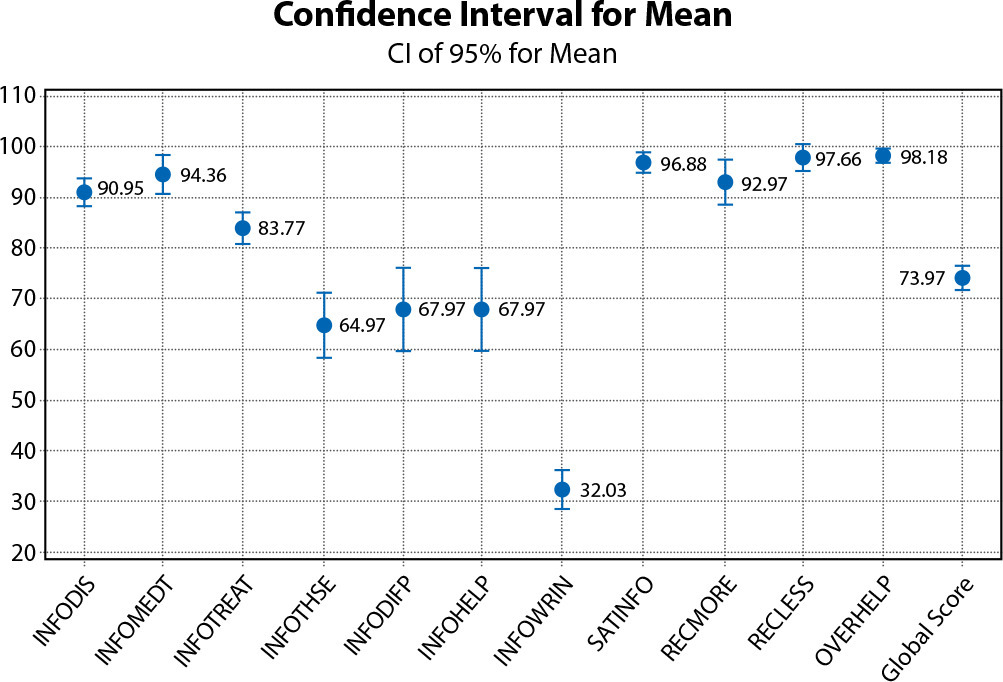
-
ORIGINAL ARTICLE06-14-2021
Continuity of neuro-psychomotor stimulation of children with congenital Zika syndrome
Revista Brasileira de Enfermagem. 2021;74(6):e20200694
Abstract
ORIGINAL ARTICLEContinuity of neuro-psychomotor stimulation of children with congenital Zika syndrome
Revista Brasileira de Enfermagem. 2021;74(6):e20200694
DOI 10.1590/0034-7167-2020-0694
Views0See moreABSTRACT
Objective:
Understand the continuity of stimulation of neuro-psychomotor development in children with congenital Zika syndrome.
Method:
Descriptive-exploratory study with theoretical support in symbolic interactionism. Between August and November 2019, 12 health professionals were interviewed in depth; and to the focus group, seven caregivers of children with the syndrome. The analysis was thematic inductive.
Results:
The continuation of neuro-psychomotor stimulation of children with Zika syndrome goes through: organizational difficulties (lack of doctors, professional unpreparedness, dissatisfaction and search for other services); socioenvironmental aspects (low maternal education, low socioeconomic level, difficulty in moving and lack of support); and conditions inherent to children (hospitalizations for respiratory crises, seizures, hypoactivity and social stigma).
Final considerations:
A strengthened support network with qualified human resources is necessary in order to provide comprehensive care and avoid the discontinuity of neuro-psychomotor stimulation of children with congenital Zika syndrome.
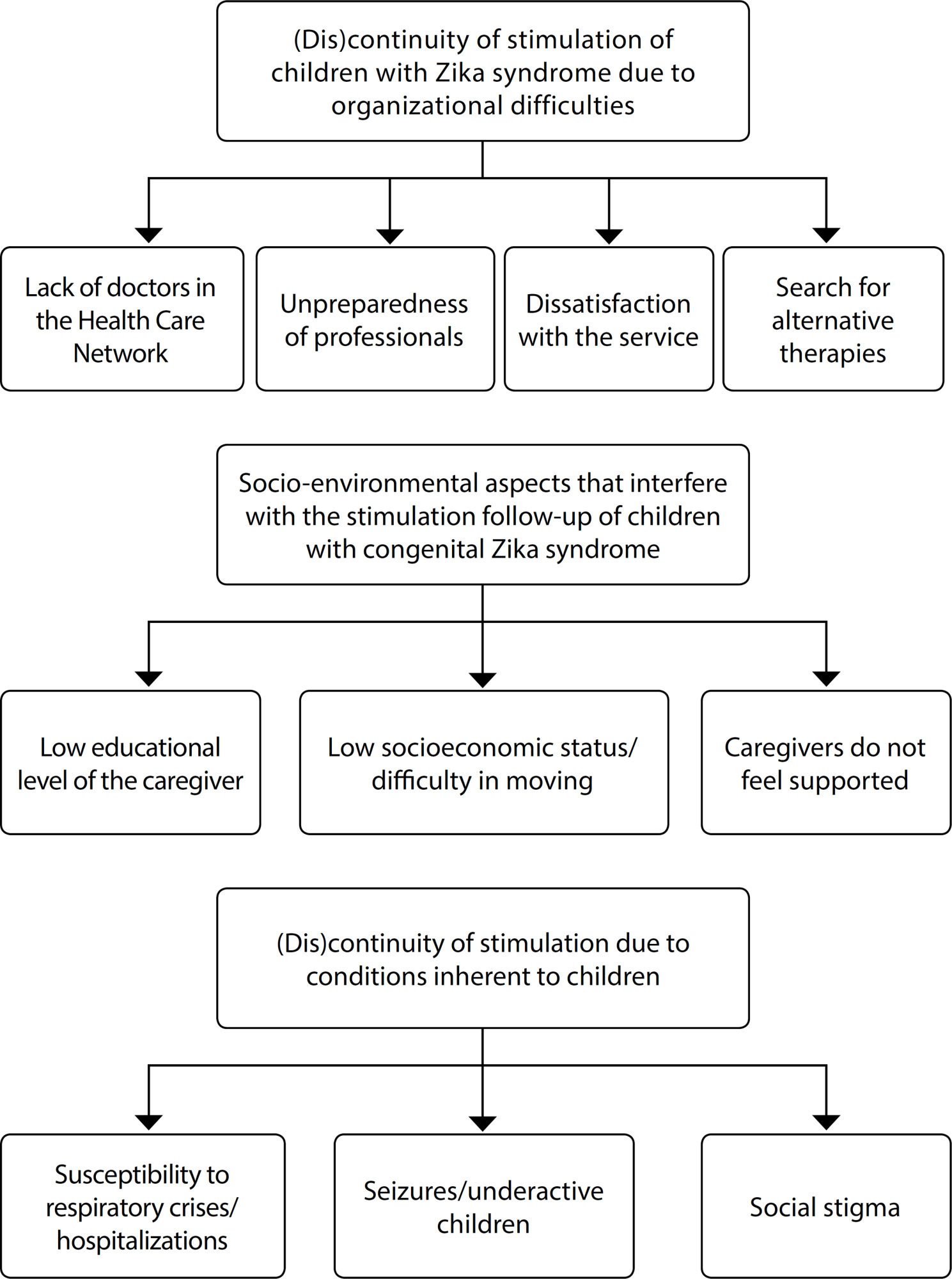
-
ORIGINAL ARTICLE08-20-2021
Risk of suicide among nursing students
Revista Brasileira de Enfermagem. 2021;74(6):e20200867
Abstract
ORIGINAL ARTICLERisk of suicide among nursing students
Revista Brasileira de Enfermagem. 2021;74(6):e20200867
DOI 10.1590/0034-7167-2020-0867
Views0See moreABSTRACT
Objectives:
to identify the risk and degree of risk of suicide in nursing students of a public institution in the countryside of Pernambuco, Brazil.
Methods:
this was a cross-sectional, quantitative research conducted with 150 students. For data collection, a sociodemographic questionnaire and the instrument, M.I.N.I. – Brazilian version 5.0.0 – Module C – Risk of suicide were used. Statistical analyses were performed with IBM(® )SPSS(®), version 23.
Results:
53.3% of nursing students had a risk of suicide, of which 20.7% had a high risk. Moreover, 22.67% reported previous suicide attempt. It is noteworthy that students without a partner have a higher risk of suicide (56.8%) than those with a partner (29.4%).
Conclusions:
it is perceived the need to develop programs that identify students at risk of suicide in higher education institutions, in order to raise awareness of the problem and implement policies to promote mental health in the academia.
-
REVIEW08-20-2021
Root Cause Analysis, Failures and Effects in pediatric total quality management: a scoping review
Revista Brasileira de Enfermagem. 2021;74(6):e20200954
Abstract
REVIEWRoot Cause Analysis, Failures and Effects in pediatric total quality management: a scoping review
Revista Brasileira de Enfermagem. 2021;74(6):e20200954
DOI 10.1590/0034-7167-2020-0954
Views0See moreABSTRACT
Objectives:
to analyze the applicability of Root Cause Analysis and Failure Mode and Effect Analysis tools, aiming to improve care in pediatric units.
Methods:
this is a scoping review carried out according to the Joanna Briggs Institute guidelines, following the Preferred Reporting Items for Systematic Reviews and Meta-Analyzes extension for Scoping Reviews. Search took place in May 2018 on 15 data sources.
Results:
search totaled 8,254 studies. After using the relevant inclusion and exclusion criteria, 15 articles were included in the review. Of these, nine were published between 2013 and 2018, 12 used Failure Mode and Effect Analysis and 11 carried out interventions to improve the quality of the processes addressed, showing good post-intervention results.
Final Considerations:
the application of the tools indicated significant changes and improvements in the services that implemented them, proving to be satisfactory for detecting opportunities for improvement, employing specific methodologies for harm reduction in pediatrics.
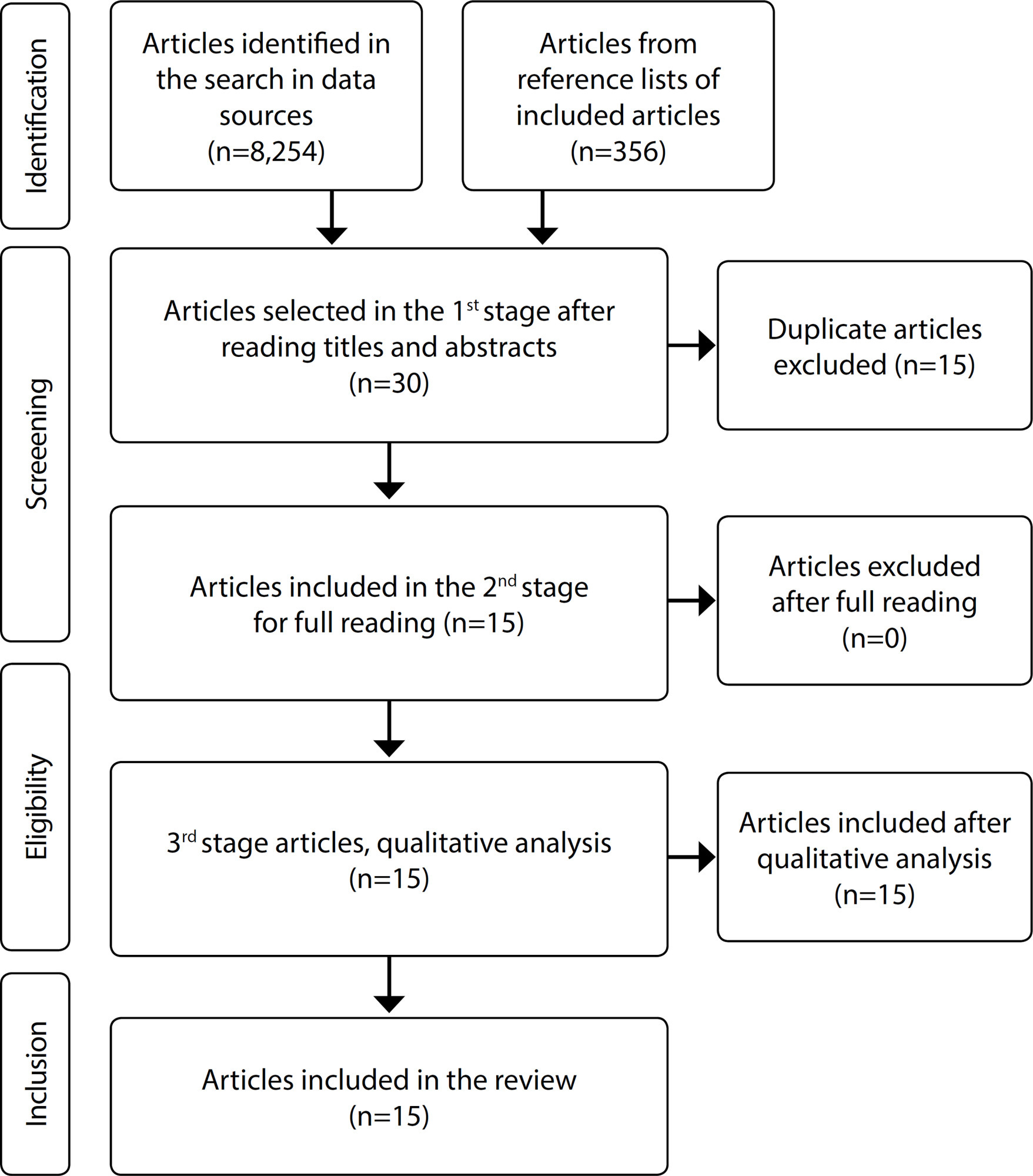
-
ORIGINAL ARTICLE07-26-2021
Representations about sexuality of people diagnosed late with HIV infection
Revista Brasileira de Enfermagem. 2021;74(6):e20201028
Abstract
ORIGINAL ARTICLERepresentations about sexuality of people diagnosed late with HIV infection
Revista Brasileira de Enfermagem. 2021;74(6):e20201028
DOI 10.1590/0034-7167-2020-1028
Views0See moreABSTRACT
Objective:
to understand the representations about sexuality of people diagnosed late with HIV infection and its implications in the delayed search for diagnosis.
Methods:
this is a qualitative study, whose theoretical and methodological framework was Social Representation Theory. The research was carried out with 18 people diagnosed late with HIV infection through an open interview. For data analysis, Structural Narration Analysis was used, with support from MAXQDA 12®.
Results:
representations about sexuality contributed to delayed diagnosis, such as trust in a fixed partnership, sexual intercourse is natural, sexuality as a taboo, search for pleasure in sexual intercourse, regardless of risks, denial of risk for HIV infection.
Final considerations:
representations about sexuality participate in a web of stereotypes and riskier ways of living, which contribute to delayed diagnosis. Sexual health education remains necessary and essential throughout people’s lives.
-
08-20-2021
Prevalence of central venous catheter salvage in newborn with staphylococcal bloodstream infection
Revista Brasileira de Enfermagem. 2021;74(6):e20201073
Abstract
Prevalence of central venous catheter salvage in newborn with staphylococcal bloodstream infection
Revista Brasileira de Enfermagem. 2021;74(6):e20201073
DOI 10.1590/0034-7167-2020-1073
Views0See moreABSTRACT
Objectives:
to establish the prevalence of salvage of central venous catheters in newborns with bloodstream infection caused by coagulase-negative staphylococci.
Methods:
retrospective cross-sectional study with 136 newborns admitted to the Neonatal Intensive Care Unit between 2011 and 2017. The total of 143 infection events undergoing antibiotic therapy were evaluated.
Results:
among the 143 infection events, 39 catheters in which antibiotic therapy was used were saved and in 69 cases, the device was removed. Positive central blood culture and single lumen catheter were factors associated with salvage failure. The probability of salvage decreased with infections diagnosed from 15 days of using the catheter. Negative blood culture raised the chance of salvage by fourfold.
Conclusions:
the use of antibiotic therapy in the treatment of infections resulted in a low prevalence of salvage of the central venous catheter. The probability of salvage was associated with variables of the device.
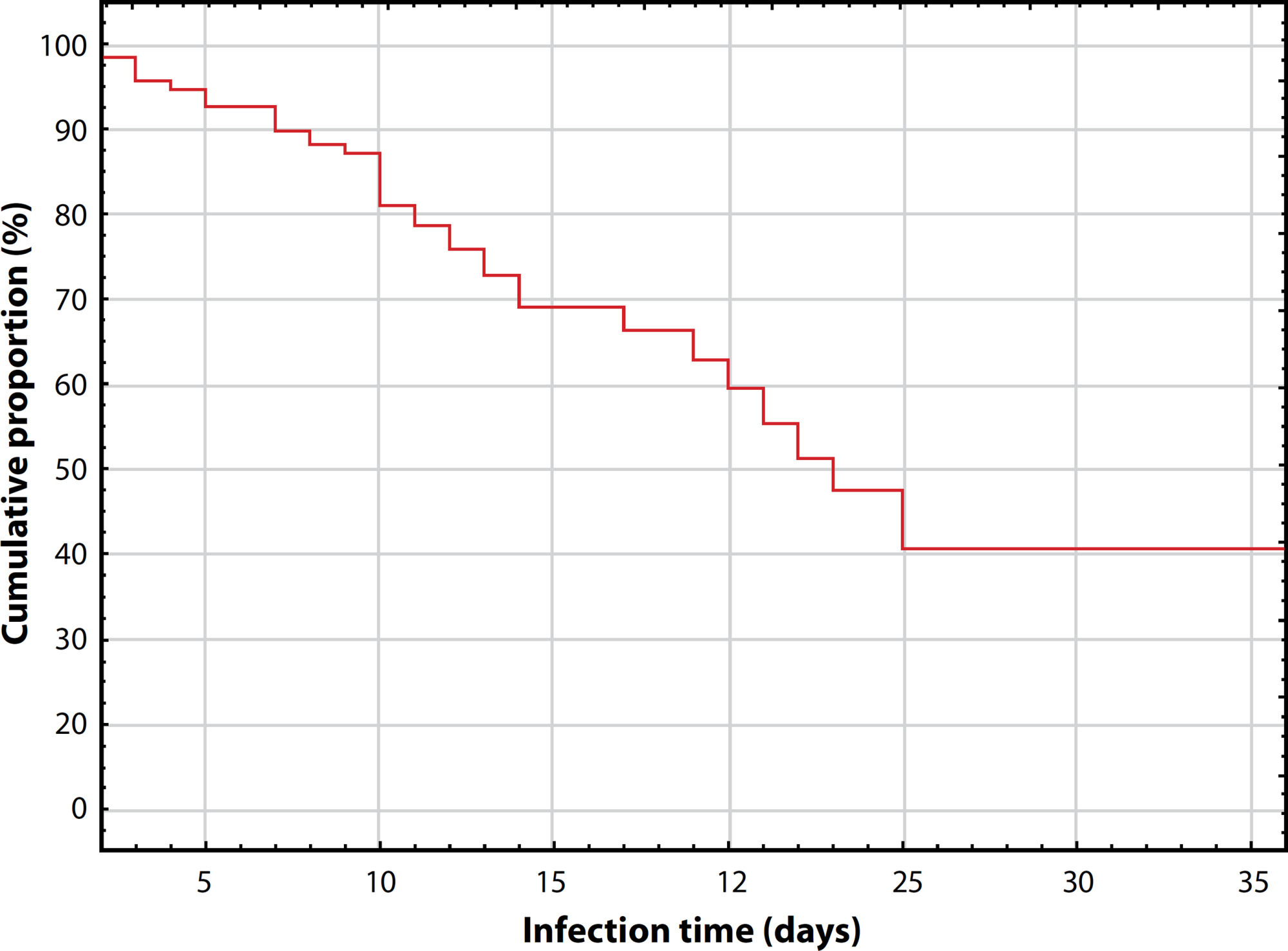
-
EXPERIENCE REPORT02-15-2021
Coronavirus infections: health care planning based on Orem’s Nursing Theory
Revista Brasileira de Enfermagem. 2021;74:e20200281
Abstract
EXPERIENCE REPORTCoronavirus infections: health care planning based on Orem’s Nursing Theory
Revista Brasileira de Enfermagem. 2021;74:e20200281
DOI 10.1590/0034-7167-2020-0281
Views0See moreABSTRACT
Objective:
to report the experience of professors and students of a graduate course on nursing care in coping with the new coronavirus (COVID-19) based on Self-Care Theory.
Method:
the active methodologies used were a literature search and seminar presentations, with an understanding of Orem’s theoretical concepts: health; man; self-care; universal, developmental and health deviation requirements; self-care activities; self-care deficits; the required therapeutic demand; nursing systems. The pandemic was considered a health deviation that requires critical thinking and nursing care planning. Methodological frameworks to classify nursing diagnoses, interventions, and outcomes were used.
Results:
for each health deviation, nursing systems were identified; self-care deficits, diagnoses; actions, interventions; and the form of assessment, outcomes.
Final considerations:
theoretical-practical reflections of the academic context support nursing care planning.
-
REFLECTION03-05-2021
Reflections on patient safety incident reporting systems
Revista Brasileira de Enfermagem. 2021;74:e20200307
Abstract
REFLECTIONReflections on patient safety incident reporting systems
Revista Brasileira de Enfermagem. 2021;74:e20200307
DOI 10.1590/0034-7167-2020-0307
Views0See moreABSTRACT
Objective:
To reflect on the main characteristics and recommendations of Incident Reporting Systems, discuss the population’s participation in reporting, and point out challenges in the Brazilian system.
Method:
Reflection study, based on Ordinance No. 529/13, which instituted the National Patient Safety Program, under Collegiate Board Resolution (CBR) No. 36/13; reflections by experts were added.
Results:
Reporting systems are a source for learning and monitoring, allow early detection of incidents, investigations and, mainly, the generation of recommendations prior to recurrences, in addition to raising information for patients and relatives. There is little participation of the population in the reporting, regardless of the type of system and characteristics such as confidentiality, anonymity, and mandatory nature.
Final Considerations:
In Brazil, although reporting is mandatory, there is an urgency to advance the involvement and participation of the population, professionals, and institutions. To simplify data entry by improving the interface and importing data from the reporting system is an objective to be achieved.
-
EXPERIENCE REPORT01-29-2021
Restructuring service at a mastology outpatient clinic during the COVID-19 pandemic
Revista Brasileira de Enfermagem. 2021;74:e20200571
Abstract
EXPERIENCE REPORTRestructuring service at a mastology outpatient clinic during the COVID-19 pandemic
Revista Brasileira de Enfermagem. 2021;74:e20200571
DOI 10.1590/0034-7167-2020-0571
Views0INTRODUCTIONCOVID-19 is a disease caused by the SARS-CoV-2 coronavirus (Severe Acute Respiratory Syndrome Coronavirus 2) and has brought a threat to public health worldwide. In need of immediate changes, adaptations tend to be the way out to avoid contamination that potentially does not distinguish race, color, gender().The global numbers of suspected and confirmed cases are […]See more
Search
Search in:
Nuvem de Tags
Adolescente (85) Atenção Primária à Saúde (239) COVID-19 (91) Criança (91) Cuidados de Enfermagem (269) Educação em Enfermagem (151) Educação em Saúde (139) Enfermagem (930) Enfermagem Pediátrica (86) Estudantes de Enfermagem (77) Estudos de Validação (131) Família (87) Idoso (208) Promoção da Saúde (99) Qualidade de Vida (104) Saúde do Trabalhador (86) Saúde Mental (145) Saúde Pública (82) Segurança do Paciente (150) Tecnologia Educacional (100)



